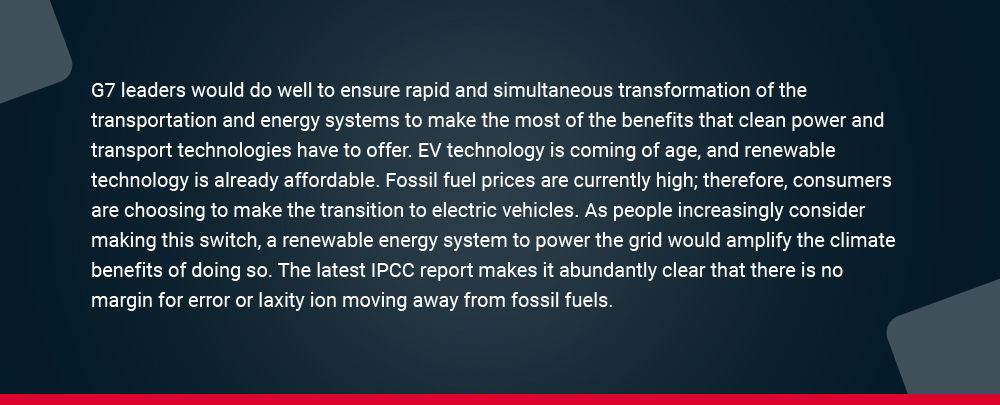India has been invited this year to join the meeting of the G7 leaders in June. The invitation itself is a historic moment. It comes at a time when a global energy crisis is looming alongside a rapidly shrinking window of time to cut emissions in line with keeping the global temperature rise below 1.50C.
We will be watching the negotiations closely. Business houses such as the Mahindra Group have been working for several years to decarbonise their own operations and supply chains. We look to the global leadership to shape policy to further accelerate action on this front.
Science-based emission reduction targets aligned with the Paris Agreement gave us, and thousands of other companies, a useful framework to understand how and where we need to reduce emissions. Deep decarbonisation can help businesses operate in a way that enables the planet to thrive. Mahindra Group, for example, has both short-term and long-term targets and milestones we are working towards.
Since vehicles are a large part of our business, we are building a portfolio of electric vehicles, both in the passenger and commercial segments. We also now have a portfolio of solar power-related businesses, covering utility-scale solar, distributed solar, and solar asset management.
Electric vehicles are a very critical element of the climate solution. In India, they are expected to make the air cleaner and reduce the negative effects of air pollution. For the climate, while the benefits of making an EV transition are significant, they are also a little more complex to achieve. And this is where strong policy action by G7 leaders will help the EV transition reach its full potential in limiting climate change.
An average petrol car produces about 35 tonnes of greenhouse gas emissions in its lifetime. Based on the current power grid in India, which is powered by over 75% coal, the lifecycle emissions for an average electric vehicle are expected to be 30% lower, about 25 tonnes. However, if India’s grid were to be powered by 100% renewable electricity, emissions per vehicle would drop down to around 7 tonnes – that's 80% lower than a regular petrol car. It’s possible to reduce the ‘embedded’ emissions – those produced in the manufacture of the car – even further by using greener, lighter, or recycled materials.

Therefore, I urge G7 leaders to be courageous and give the private sector the clarity it needs. Give us specific milestones for the transformation of our economic systems in line with halving global emissions by 2030. Clear signals like these will enable the private sector to confidently increase the pace and scale of redirecting resources and capital towards electric vehicles and clean energy. We need both transformations to happen equally fast if we are to successfully limit the global temperature rise to 1.5C.
The decisions taken by G7 leaders will have knock-on effects well beyond their own national boundaries. Climate change is a global problem and needs global solutions. Companies like ours in emerging markets can be nimble and adaptive, and with the right economic signals, can give us the confidence to continue investment at scale.
India is home to many global supply chain companies. It is therefore in the interest of all G7 nations, and the major companies headquartered there, to urgently create regulatory and financial frameworks that encourage the flow of capital to scale up the clean energy and transport systems everywhere in the world. This will help multinationals reach their own climate targets right across their supply chains and prevent global warming at catastrophic levels.
There are numerous benefits to a clean energy system in a nation like India. Firstly, it will help India achieve its own climate goals. It will further increase the country’s appeal to multinational customers seeking suppliers. It will generate new jobs in the clean energy sector, reduce pollution, and, critically, bring hope for a more stable future in which global temperature rise is limited to 1.5C.
This is the moment for G7 leaders to be on the right side of history; to steer the ship towards a future of clean power and transport where future generations can thrive.
You can also share your thoughts in the Comments section below!




